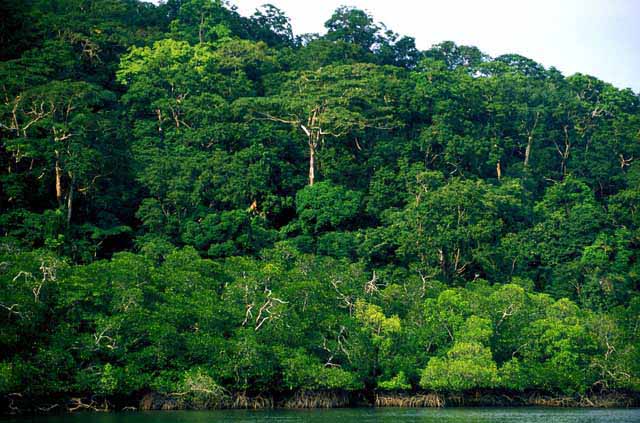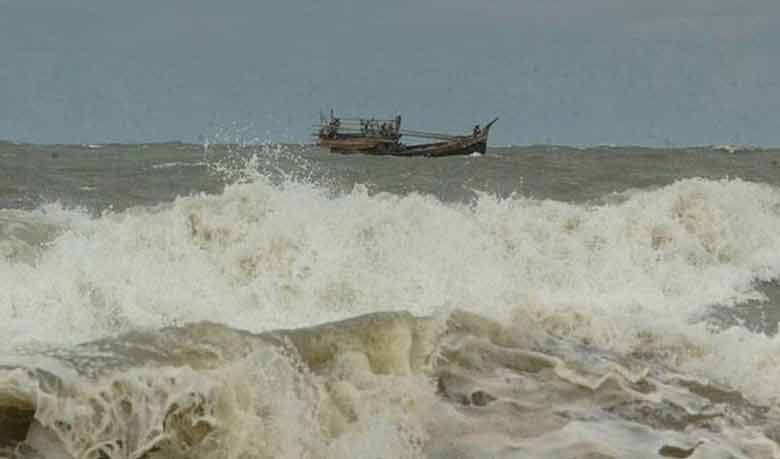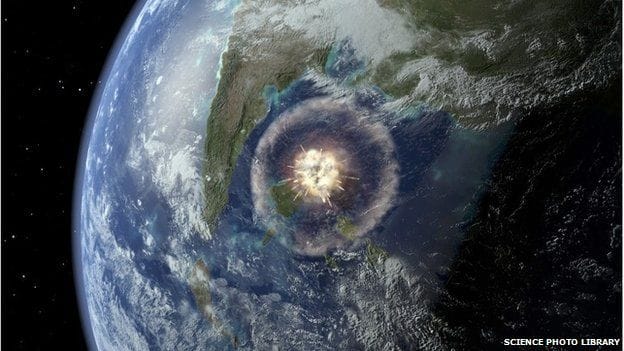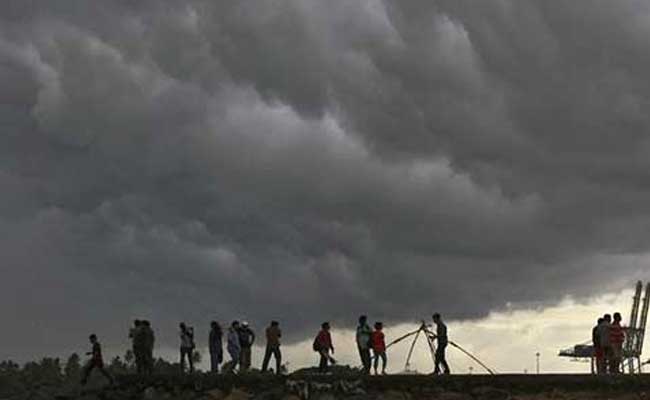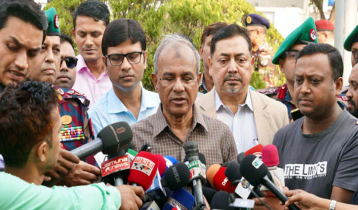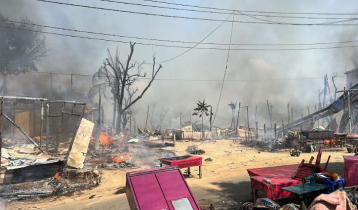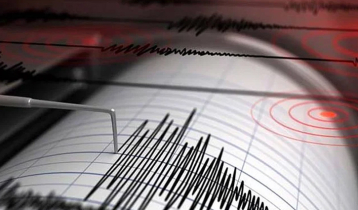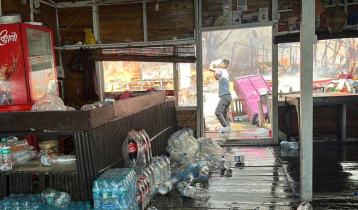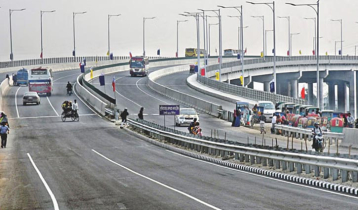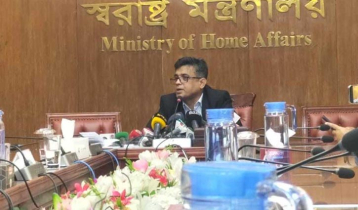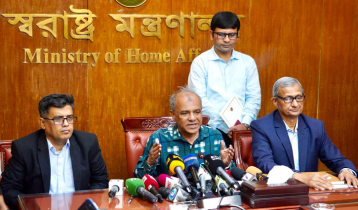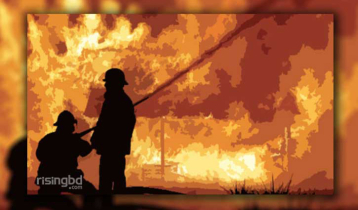Earthquake risk in Bangladesh
Augustin Sujan || risingbd.com

Map indicates Earthquake Zones in Bangladesh
Debasish Das from UK: During my recent visit in Bangladesh, I met with my several classmates and friends. We were in a restaurant to have our diner together as after a long time we got together. During the dinner, we were talking about climate change and growing warm weather all over the country including Dhaka City.
One of my friends told me the climate changing and hot weather will be the main reason behind the next great earthquake in Bangladesh. We had a long discussion and everyone opined that the “Climate change and hot weather will effect very much in Bangladesh and it will cause the next earthquake in Bangladesh”. But I informed them there is no scientific theory or evidence that global warming or climate changes cause the earthquake. They told me they had read the several news papers, research, journals etc and got this information.
Few years ago Seismologist Leonardo Seeber inspected about the risk of earthquake in Bangladesh. Bangladesh is positioned at the juncture of several active tectonic plate boundaries. Moreover, it sits atop the world’s largest river delta at close to sea level, facing both the risk posed by a quake and secondary risks of tsunamis and flooding in the quake’s aftermath. These teaching case materials show the fieldwork of an international team of scientists working to provide Bangladeshi leaders the tools they need to understand and minimize geologic risks. Using both seismic and sedimentary data, scientists are attempting to model the interactions between past earthquakes and river-course shifts – an invaluable aid in predicting future quakes and how they could impact this unique terrain.
Earth processes are so powerful that humans cannot hope to control them. But, by understanding what causes these hazards and why they occur, we can do a great deal to reduce their harmful impacts and save lives. Actually what is the earthquake? And why it happened? We need to go little details and we will understand the main causes of earthquake and how it will affect in Bangladesh. Is it Bangladesh really risk for the next earthquake according to the scientist research or is it only prediction? But there is no theoretically has proven that climate change or global warming to lead the risk of earthquake anywhere in the world.
In the oxford dictionary the definition of earthquake is “A sudden violent shaking of the ground, typically causing great destruction, as a result of movements within the earth’s crust or volcanic action”. The causes of earthquake are movements within the Earth’s crust cause stress to build up at points of weakness, and rocks to deform. The stored energy is suddenly released as an earthquake. These earthquake belts provide an important clue in the development of the theory of plate tectonics. A map of the world`s earthquakes shows that most of them lie in narrow zones, often around the edges of the continents, or in the middle of the oceans.
If we look at the pattern of where earthquakes occur around the world, it is clear that most of the earthquake activity is concentrated in a number of distinct earthquake belts. For instance, there are many earthquakes recorded around the edge of the Pacific Ocean, or in the middle of the Atlantic Ocean.
An earthquake is caused by a sudden slip on a fault. The tectonic plates are always slowly moving, but they get stuck at their edges due to friction. When the stress on the edge overcomes the friction, there is an earthquake that releases energy in waves that travel through the earth`s crust and cause the shaking that we feel. Hot magma rises from the mantle at mid-ocean ridges pushing the plates apart. Earthquakes occur along the fractures that appear as the plates move apart.
What causes earthquakes and where do they happen?
The earth has four major layers: the inner core, outer core, mantle and crust. The crust and the top of the mantle make up a thin skin on the surface of our planet. But this skin is not all in one piece – it is made up of many pieces like a puzzle covering the surface of the earth. Not only that, but
these puzzle pieces keep slowly moving around, sliding past one another and bumping into each other. We call these puzzle pieces tectonic plates, and the edges of the plates are called the plate boundaries.
The plate boundaries are made up of many faults, and most of the earthquakes around the world occur on these faults. Since the edges of the plates are rough, they get stuck while the rest of the plate keeps moving. Finally, when the plate has moved far enough, the edges unstick on one of the faults and there is an earthquake.
Can climate change cause earthquakes?
It`s hard to see how anyone could invoke climate change and earthquakes in the same sentence without getting some stick, a changing climate can affect the ground beneath our feet with derision. But a closer look suggests the theory not only makes sense, it also appears to have historical precedent.
The argument
First, though, the theory. The argument goes like this: when the climate changed naturally in the past, and the planet emerged from an ice age, large ice sheets covering much of the planet retreated. They were so heavy that the resulting release of pressure on the earth`s crust caused it to `bounce back`, triggering earthquakes, tremors, and even volcanic activity along pre-existing fault lines. Right now, the Earth is still responding to the end of the last ice age some 20,000 years ago when temperatures began to rise, causing large ice sheets to retreat, as shown here: McGuire suggests that if man-made climate change leads to more large ice sheets disappearing - like the one covering Greenland - this could lead to more shakes, rattles and rolls.
Extreme weather is moving tectonic plates, scientists claim. People who are ridiculed for saying that earthquakes are a result of global warming could actually be right, scientists claim. Long-term climate change has the potential to spin Earth`s tectonic plates, according to a news study from the Australian National University. So in Bangladesh context high warming may cause the risk of earthquake there. But it is not scientifically proven that this is the only cause that next earthquake risk in Bangladesh.
We can get more information about it when we see working with researchers in Germany and France, they have established a link between the motion of the Indian plate over the last ten million years and the intensification of Indian monsoons. Monsoon rain increased by four metres every year, speeding up the motion in the Indian plate by one centimetre a year, said Dr Giampiero Iaffaldano from the ANU research school of earth sciences. Movements of the earth, tectonic plate movement could be sped up as a result of the weather. Again this is only prediction but there is no established record.
How are earthquakes recorded?
Now we see when the earthquake happened, how it recorded? Earthquakes are recorded by instruments called seismographs. The recording they make is called a seismogram.
The seismograph (figure) has a base that sets firmly in the ground, and a heavy weight that hangs free. When an earthquake causes the ground to shake, the base of the seismograph shakes too, but the hanging weight does not. Instead the spring or string that it is hanging from absorbs all the movement. The difference in position between the shaking part of the seismograph and the motionless part is what is recorded. The strength of the shaking of the earthquake is measured by Richter scale. The magnitude is labelled as 3 or lower earthquake and crossing 7 high magnitudes that can causes serious damage population, life and buildings, establishments etc.
Can scientists predict earthquakes?
No, and it is unlikely they will ever be able to predict them. Scientists have tried many different ways of predicting earthquakes, but none have been successful. On any particular fault, scientists know there will be another earthquake sometime in the future, but they have no way of telling when it will happen. These are two questions that do not yet have definite answers. If weather does affect earthquake occurrence, or if some animals or people can tell when an earthquake is coming, we do not yet understand how it works.
If we analysed lots of research and article about the risk factor of earthquake in Bangladesh, most of them are prediction and own ideas. Some of them identified the present location and climate changes are the big factor for the possibility risk of earthquake in Bangladesh. But my concern all these above argument and scientifically proved that climate change and weather do not effect or the main risk factor of the earthquake. We can say the recent climate change became a big factor of the life style the people of Bangladesh because of storm, warm weather and bad weather etc. But these climate changes will not the main factor that Bangladesh will risk to lead for the earthquake. If the earthquake will happen in Bangladesh, it will be the natural cause not for the climate change. If we go details we find what climate changes effects the Bangladesh.
Carbon combines with oxygen in the atmosphere to form carbon dioxide (CO2). The geological record (past climate evidence) shows how CO2varies over the life spans of glaciations, but modern measurements of atmospheric CO2 show that levels are higher than they have been for at least three million years. Greenhouse effect is the main factor to frequently change the climate in Bangladesh. But the people of Bangladesh also responsible for this condition as there is no sufficient forestation and favourable conditions to support the greenery environment. What we experienced in recent political violence in Bangladesh. Few aggressive people destroyed the thousand of green tress which is severely affecting the environment. There are lots ponds, lake, cannel and rivers vanished from the geography of Bangladesh due to urbanisation. As a result the environmental balances destroyed by the few people instead of preserve them.
Man-made climate change
The increase of CO2 in modern times, most likely due to humans burning fossil fuels, has led to an enhanced greenhouse effect which is increasing our planet’s average temperature. As a result sea levels are rising, partly because ocean water is expanding as it warms, and partly because polar ice is melting. Climate change is already causing ecosystems to change.
Because the Earth’s climate has changed in the past, it is a reasonable assumption that it will continue to change in the future. The amount of carbon dioxide (CO2) in the atmosphere has increased since the start of the industrial revolution and it is increasing rapidly now. There is likely to be a greater proportion of CO2 in the atmosphere in the future. Because of the interaction between the factors that control the Earth’s climate it is difficult to predict how the temperature of the Earth might respond to changes in CO2, however it is widely believed that the temperature will rise.
What effects might this have?
Wildlife
Living organisms are likely to respond to changes in temperature and climate. They might adapt or migrate to experience more acceptable conditions. If species are unable to adapt or migrate and conditions become inhospitable they could become extinct.
Agriculture
Different crops demand different conditions to grow successfully. Even within a country like Bangladesh, crops like apples are grown in some places and not in others. This regional variation in agriculture is often down to different local conditions and this includes the climate. If temperatures rise, then some crops may become harder to cultivate and may have to be replaced with different ones, more suited to the new environment. IRRI, BRRI and other agricultural institutions in Bangladesh needs to work more regarding the frequently climate changing.
Extreme weather
As the Earth warms up, the oceans and atmosphere interact and can amplify the frequency and intensity of weather events. These include hurricanes, floods and droughts.
Sea level rise
One response to climate change is a rise in sea level. This is caused both by melting of ice and the thermal expansion of sea water (as sea water becomes warmer it expands to occupy a greater volume). If the sea level rises then land is lost with low-lying areas becoming prone to flooding. These changes in sea level, flooding, and land claimed by the sea are nothing new, however, the big difference today is that humans very often live in the places that will be invaded by the sea if it rises by even a small amount.
Therefore, above this analysis regarding the risk factor of the earthquake in Bangladesh, we say there is no sufficient evidence that climate changes or global warming will effect and lead the Bangladesh to risk the earthquake. Most geologists insist that there is no correlation between the two. Do we think there is such a thing as “earthquake weather”? I believe that for the same reasons the scientific community does not believe weather or climate change causing has anything relating with earthquakes?
But department of Disaster Management (DDM) under the Ministry of Disaster Management’s (The government of Bangladesh) website, we can find few information of earthquake happened in Bangladesh. There is no sufficient information on that website as some more information and link should be added there as the people of Bangladesh will know more about earthquake and its cause and effects etc. Government should more concentrate about this risk factor and if it will happen how they will face or mitigate the crisis within their limited resources.
The number one job will be identified the vulnerable building and establishment and deal with these problems (High risk factors) immediately without any compromise. It should be a higher level of supervision and monitoring authority and prime minister should handle this issue as a main agenda in her government. Because if any earthquake will happen in Bangladesh, there will be a no option to think and take decision on that point, if there is no appropriate action been taken to mitigate this sever crisis earlier than later.
Debasish Das, MA, MBA (UK) Diploma in Crime prevention (Distinction): Author of a Tourism book - “Bangladesh –E- Parjatan Akarshon”, Research scholar & freelance writer, worked in a Renown University in UK at present Working in Facilities and crime Prevention Unit, Public Sector in UK.
risingbd/Augustin Sujan
risingbd.com



